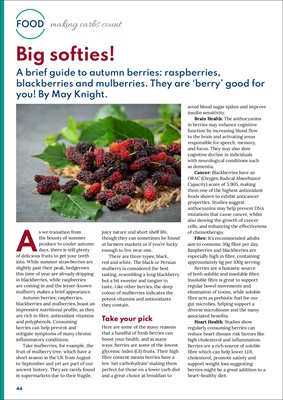
44
FOOD making carbs count
Big softies!
A brief guide to autumn berries: raspberries,
blackberries and mulberries. They are 'berry' good for
you! By May Knight.
As we transition from
the bounty of summer
produce to cooler autumn
days, there is still plenty
of delicious fruits to get your teeth
into. While summer strawberries are
slightly past their peak, hedgerows
this time of year are already dripping
in blackberries, while raspberries
are coming in and the lesser-known
mulberry makes a brief appearance.
Autumn berries; raspberries,
blackberries and mulberries, boast an
impressive nutritional profile, as they
are rich in fibre, antioxidant vitamins
and polyphenols. Consuming
berries can help prevent and
mitigate symptoms of many chronic
inflammatory conditions.
Take mulberries, for example, the
fruit of mulberry tree, which have a
short season in the UK from August
to September and yet are part of our
ancient history. They are rarely found
in supermarkets due to their fragile,
juicy nature and short shelf life,
though they can sometimes be found
at farmers markets or if you're lucky
enough to live near one.
There are three types; black,
red and white. The black or Persian
mulberry is considered the best
tasting, resembling a long blackberry
but a bit sweeter and tangier in
taste. Like other berries, the deep
colour of mulberries indicates the
potent vitamins and antioxidants
they contain.
Take your pick
Here are some of the many reasons
that a handful of fresh berries can
boost your health, and in many
ways. Berries are some of the lowest
glycemic index (GI) fruits. Their high
fibre content means berries have a
low 'net carbohydrate' making them
perfect for those on a lower carb diet
and a great choice at breakfast to
avoid blood sugar spikes and improve
insulin sensitivity.
Brain Health: The anthocyanins
in berries may enhance cognitive
function by increasing blood flow
to the brain and activating areas
responsible for speech, memory,
and focus. They may also slow
cognitive decline in individuals
with neurological conditions such
as dementia.
Cancer: Blackberries have an
ORAC (Oxygen Radical Absorbance
Capacity) score of 5,905, making
them one of the highest antioxidant
foods shown to exhibit anticancer
properties. Studies suggest
anthocyanins may help prevent DNA
mutations that cause cancer, whilst
also slowing the growth of cancer
cells, and enhancing the effectiveness
of chemotherapy.
Fibre: It's recommended adults
aim to consume 30g fibre per day.
Raspberries and blackberries are
especially high in fibre, containing
approximately 6g per 100g serving.
Berries are a fantastic source
of both soluble and insoluble fibre.
Insoluble fibre is great to support
regular bowel movements and
elimination of toxins, while soluble
fibre acts as prebiotic fuel for our
gut microbes, helping support a
diverse microbiome and the many
associated benefits.
Heart Health: Studies show
regularly consuming berries can
reduce heart disease risk factors like
high cholesterol and inflammation.
Berries are a rich source of soluble
fibre which can help lower LDL
cholesterol, promote satiety and
support weight loss suggesting
berries might be a great addition to a
heart-healthy diet.